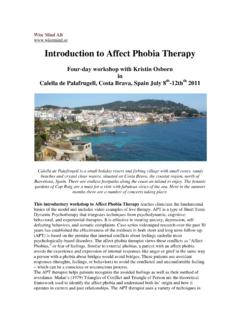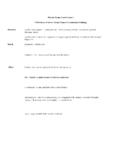Transcription of Panic and Phobias - CNWL Talking Therapies Service
1 Panic and Phobias Your self help guide Your partner in care & improvement Contents 03 What is a Panic attack? 05 What is a phobia? 06 Recognising Panic 10 Understanding Panic 12 What causes Panic attacks to begin? 14 What causes Phobias to develop? 15 What keeps Panic attacks going? 18 Can Panic attacks really harm me? 18 What techniques can help me cope with and reduce Panic attacks and Phobias ? 27 Graded practice 32 Coping with setbacks 33 Staying well plan 37 Further help 38 Further reading 39 Further support 42 Emergencies 43 Acknowledgements 02. What is a Panic attack? Everyone knows what Panic is, and it is common to feel panicky from time to time: You get the sense that you are being followed on your way home from a party, late at night You discover you have had your wallet stolen You are sitting an exam.
2 You look at the paper and realise you don't know the answers to any of the questions Someone runs in front of your car and you almost hit them. It would be normal in any of these situations to feel a sense of Panic . The feeling would be understandable and would pass fairly quickly. A Panic attack is a bit like normal Panic , but different in a number of ways: The feelings seem to come out of the blue and are not usually related to the sort of frightening situation described above The feelings are a lot stronger. As the feelings are UNEXPECTED and STRONG they can feel extremely frightening. 03. Panic attacks affect people in many different ways, but there is usually a frightening feeling that something really awful is about to happen. The truth is nothing awful is going to happen, as Panic attack sare not dangerous.
3 Lots of people have Panic attacks, although they can affect people in different ways. Some people have only one, others may have them for many years. Some people have them every day, some people only once in a while. If you were to ask all of your friends if they had ever had a Panic attack, it is very likely that at least one or two will have had the same experience. They are quite common and NOT a sign of serious mental or physical illness. Some non-serious physical conditions can cause symptoms similar to Panic attacks. For example: Certain medicine taken together Thyroid problems Drinking too much caffeine Pregnancy Low blood sugar. If, after reading this booklet, you are concerned that your problem may have a physical cause and you have not yet had a check-up from your GP, then it may be a good idea to make an appointment.
4 Sometimes Panic regularly occurs in response to a specific situation or a specific object. This is often known as a phobia. 04. What is a phobia? A phobia is a very intense fear of an object or situation that is not actually dangerous. However the fear of these can cause a great deal of distress and can severely restrict a person's life. A person with a phobia will go to great lengths to avoid the thing that they fear. For example, a person with a dental phobia may totally avoid going to the dentist even though they are in severe pain as a result. Types of phobia Phobia and avoidance of a specific object or situation A person can develop a phobia of almost any object or situation. Objects commonly associated with Phobias include fear of animals and insects ( birds, dogs, mice, wasps or spiders).
5 Specific situations include fear of driving, flying, heights or being in the dark. Phobias can also develop about social situations such as public speaking or social events such as parties. Extreme anxiety across social situations is known as social phobia . Avoidance of places or situations that are hard to escape from Anxiety and Panic can develop in situations where people feel trapped busy supermarkets, crowded buses or trains, traffic jams, or being outside and far away from home. As a result of this anxiety, the person might avoid the situation leading to a phobia developing. Fear of a situation where leaving is difficult is called agoraphobia . This booklet aims to help you reduce your Panic attacks and Phobias by helping you to: Recognise whether or not you are having Panic attacks Understand Panic , what causes it and what keeps it going Accept that Panic cannot harm you Learn techniques to reduce Panic .
6 05. Recognising Panic How do I know if I am having a Panic attack? This may sound obvious, but it isn't. Sometimes Panic feels so awful, and comes so out of the blue , that people can't quite believe that it's only a Panic attack, and think it must be something more serious. The feeling of a Panic attack can be so unusual that you may not even realise this is what is happening. One of the most important first steps in overcoming Panic attacks is recognising whether or not your symptoms are caused by a Panic attack. Panic affects your body, your mind and the way you behave. The following are some of the most common symptoms experienced by people having a Panic attack. Some people may experience all of these symptoms, others just a few. Summary Panic attacks and Phobias are very common and treatable.
7 They are NOT. dangerous and are NOT a sign of serious mental or physical illness. 06. Your body (please tick those that apply). Heart pounding, beating fast or skipping a beat Heart seems to stop, followed by a big thud, chest pains Changes in your breathing, either gulping air, breathing fast or feeling short of breath Pounding in your head Numbness or tingling fingers, toes or lips Feeling as though you can't swallow, feeling sick Feeling as though you're going to faint, wobbly legs. Write down any other symptons: Your mind (please tick any thoughts or feelings that apply). Feelings of utter terror Feelings of unreality, as though you're not really there You feel anxious in situations where you have had a Panic attack before. Frightening thoughts (please tick those that apply).
8 I'm going to have a heart attack . I will collapse or faint . I'm running out of air . I'm going mad . I'm choking . 07. I'm going to be sick . I'm losing control . I'm going to make a complete fool of myself . I've got to get out of here . Write down any other frightening thoughts or feelings: Remember these things never actually happen in a Panic attack, but people sometimes think they will. What you do/your behaviour (please tick any of these that apply to you). You avoid situations that have caused Panic or that you fear might cause Panic , for example going shopping Escape as soon as you can when panicking, for example rushing around the supermarket to get out as soon as possible Prevent what you think is going to happen, by doing something to make yourself safe, for example gulping air if you think you are going to suffocate, sitting down if you think you are going to faint, lying down if you think you are having a heart attack, or scanning your body for evidence of something wrong 08.
9 Seek help In one study a quarter of all people having their first Panic attack called an ambulance or went to accident and emergency, they were so convinced something dangerous was happening to them. Perhaps you have done this, or called out the GP? Cope People often try to cope with a Panic attack by doing things they have found or have been told are helpful, for example, distracting themselves or trying to relax. Write down anything else you do or don't do as a result of having a Panic attack: Whilst all of these things can help to stop a Panic attack, as we shall see later, they can also become part of the problem. If you have ticked quite a few of these symptoms, thoughts and behaviours, then it is likely that you are suffering from Panic attacks. Summary A Panic attack is a strong feeling of terror that comes on very suddenly.
10 Physical symptoms include pounding heart, fast breathing, shaking, and wobbly legs. People often have lots of frightening thoughts and think something awful is happening. They often try to avoid or escape the Panic . But Panic is not dangerous or harmful. 09. Understanding Panic What causes it and what keeps it going? All of the Panic symptoms described previously are nothing more than an extreme form of fear. Fear is our body's natural response to a situation perceived as threatening. Fear can range from mild anxiety (which can be helpful when there is a goal, like passing an exam) through to full blown Panic . But why have fear at all when it's such an unpleasant feeling? In a way, it is a bit like pain. If you were to break your ankle, it would feel very painful, which would be a warning to you not to walk on it.




